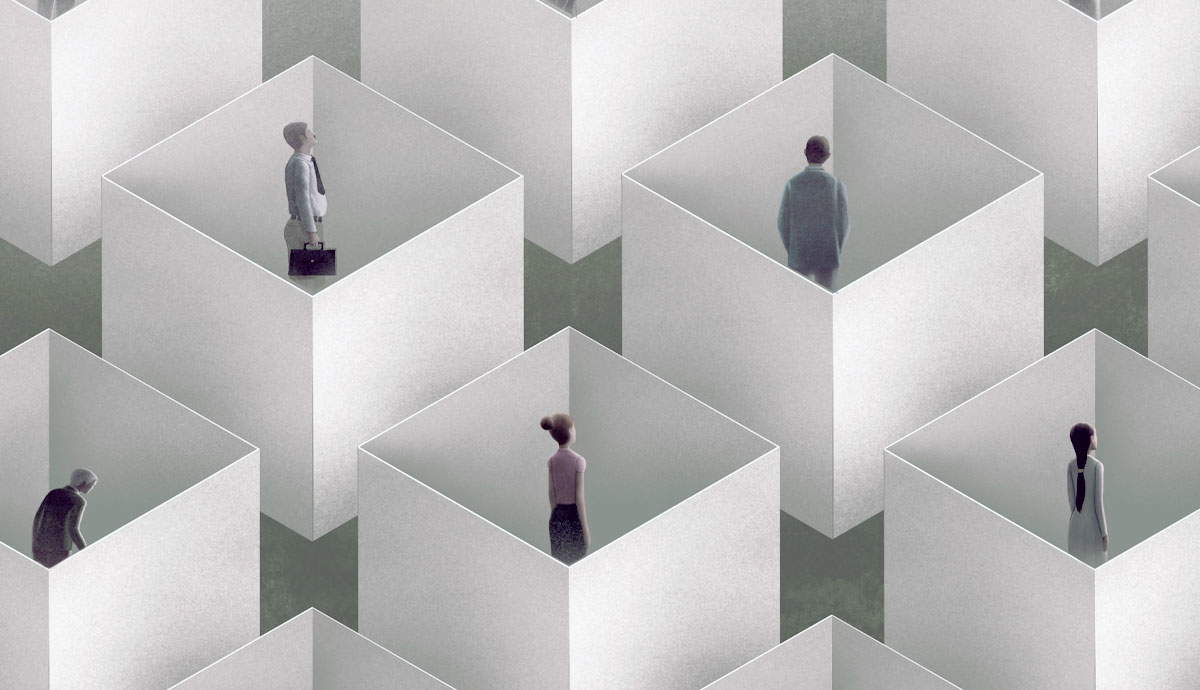
Amongst the many teachings which have been passed down from antiquity today, one group that stands out by itself next to the conventional Stoics and hedonistic Epicureans are the Cynics. Cynicism focuses on everyday ethics concerning humankind’s place within the world. What did they believe about the right way one should live life?
Rule 1: Do Not Get Attached to Places

The idea of buying a home with any kind of mortgage would have made the Cynics, who lived as nomadic travelers, very confused. Their ideals espoused a form of extreme self-sufficiency called autarky, which meant little dependence on external circumstances whatsoever.
But this ideal does not preach escaping from reality, nor does it show one isolated in an “ivory castle.” Imitating Socrates, who remained unchanged as a man and less dependent on his outward appearance or on material goods, the Cynics believed removing oneself from society allows for greater insight and understanding.
Antisthenes, one of the Cynics, championed the use of cloaks, a staff, and knapsacks among his followers. These things offered protection against the weather and enemies but also assured having food available during trips.
Most famously, Diogenes of Sinope recognized that there was some allure to a nomadic lifestyle when he noted an unconcerned mouse scampering past him. This mouse did not mind not having a proper outfit, comfy sleeping arrangements, or not knowing where tomorrow’s meal would come from.
It was this observation that influenced Diogenes to adopt a similar way of life: he slept on a folded cloak, outside. Millennials today are less inclined to get into or purchase real estate or new cars (a problem for car manufacturers). Many choose to rent housing compared to buying because of easier relocation, or because buying is not an option.
Buying a house and establishing oneself are no longer signifying victory and wealth in the society like they used to be. Moving around has become the norm in modern society due to its benefits, rather than owning expensive stuff.
Rule 2: Do Not Depend on Material Values

Later, Diogenes still found a more or less permanent home in the Metroon (Temple of Cybele). Contrary to what most people believe, it was not a barrel. Ancient Greeks did not make wooden barrels fastened with rims and instead preferred storing wine, grain, and oil in earthenware vessels. This giant vessel—pithos—which was where Diogenes settled—had enough room to accommodate him all his life; he owned only the bare minimum of personal belongings.
He viewed rulers, doctors, and philosophers as among the most intelligent people. On the other hand, he believed that dream interpreters, soothsayers, and those who believe them, as well as people who boast about their fame or wealth, represent the most foolish.
The cynic Crates, a philosopher who had spent much of his life as a beggar, deemed it wise to own nothing material. Without going into great detail about Cynic rhetoric, he urged people not to seek material values and to keep a healthy distance between themselves and material wealth. That way, they would remain unaffected by the dangers associated with worldly possessions.
Crates did not actually think that material values are necessarily bad. Still, they should be enjoyed within reasonable limits and never acquired as an obsession or be a source of pride. Having fewer things also gives one more time to focus on what holds real value, such as cultivating meaningful relationships with like-minded people.
If living in a pithos is too much for you, look at the minimalistic principles of living. Try decluttering first, and then mindful shopping. Most probably, there are many things which seem necessary to you, but really—are just dead weight.
Rule 3: Constantly Strengthen Your Body and Spirit

Those who wanted to live a nomadic life and be truly autonomous had to develop the habit of resilience. The Cynics believed that practicing self-restraint is what gives inner strength and empowers people. Therefore, they deliberately renounced comfort and instead chose to face constant hardships. The discovery of the possibility of reaching greater simplicity brought genuine happiness to the Cynics. This kind of strict self-discipline is called ascesis.
Once, seeing a boy drinking water from his hand, Diogenes threw away his cup. To get used to rejection, he asked the statues for alms. And in order to harden body, he walked barefoot, including in snow.
Nowadays, many people choose asceticism, and this should not necessarily be associated with any kind of religious practice. For one person, it may be a way to develop the will, become stronger, and focus on the things that matter.
A person striving for asceticism does not care about how much money they have or what kind of job they do. Simplifying life is the basis of asceticism, along with rejecting those things which bring material or physical pleasure.
Willpower does not need to come from cold water or fasting. Mindfulness, by itself, can do the trick. It allows people to make intelligent decisions when faced with temptation.
Exercises that are very intense may leave a deep impression, but regular and moderate exercise already enhances physical and mental strength considerably. Sometimes it is easier to adopt a small positive habit than to dive into freezing waters.
Rule 4: Do Not Curry Favor with Authorities

Many people know that Alexander the Great once visited Diogenes and said he could ask for anything. The philosopher expressed his wish, without any respect at all for the commander, asking: “Now move at least a little out of the sun.” (This anecdote is probably of later origin, but it certainly reflects the cynical spirit.)
The impact left by the Cynics went far beyond just those who held positions of power; it reached deep into philosophical circles. Antisthenes and Diogenes spared no effort whatsoever to publicly deride Plato—an eminent intellectual figure in ancient Greece—whom they ridiculed for propounding a doctrine on ideas that they perceived as excessively abstract and divorced from reality.
Moreover, because they perceived Plato as arrogant and pretentious, they never missed their chance to crack jokes about his Platonic school. Once, in Plato’s presence, Diogenes brought a plucked rooster there to show the insufficiency of Plato’s definition of men, which was “Man is an animal with two legs and no feathers.”
Being this anti-authority is not always feasible. Sometimes it is best to protest before dissent is actually prohibited. This allows everyone to air their problems in an open public discussion instead of just hushing them up and building resentment.
Yet more importantly, there may be cases when you really do not know if you should protest or not—maybe someone made mistakes but there is a lot of goodwill left.
In those cases, by not protesting, you can avoid seeming to curry favor with the authorities—it doesn’t matter whether we are talking about a superior or the informal leader in the company.
Rule 5: Reject Conventions

The Cynics sometimes shocked their fellow citizens with odd behavior in public spaces. These behaviors represented attempts to make the subjectivity of rules vivid, soothe anxieties aroused by avoidance of standard societal conduct, and refocus on more substantial intellectual and emotional issues.
Once, Crates forced his pupil Zeno of Citium to march through Athens while holding a pot of lentil stew to teach him humility (lentils were considered food that only the poor would eat). When Crates noticed that Zeno was embarrassed, he broke the pot with a staff in a theatrical manner.
Soaked in lentil stew, Zeno tried running away while Crates shouted after him: “Why are you running, little Phoenician? Nothing terrible has happened to you!” Unable to stand such trials, Zeno left the Cynics and formed the school of Stoics. They also taught self-restraint, but with fewer shame-inducing trials and performances.
Once, to a man who wanted to study philosophy, Diogenes gave a fish (a tunny, to be specific) and ordered him to walk around with it. When the man threw the fish and left in shame, Diogenes laughed: “The friendship between you and me was broken by a tunny!”
According to Diogenes, the majority of humans are so close to insanity that it takes only a single finger to push them over the edge. To explain this, he used the following example: if someone liberally waves or points their middle finger at an object indiscriminately, many would consider them insane or at least very weird. On the other hand, having one’s index finger prod others is acceptable and viewed as within society’s psyche, even though it is rude.

It is interesting to question what the role of social convention is now, thousands of years after Diogenes lived. For example, the average citizen who steps out into the courtyard of the corporation where a person stands outside the main doors will light up a cigarette or make a telephone call without any scruples or bothering with courtesy. Obviously, such behaviors are, at best, considered slightly rude, but not at all odd or unusual.
On the other hand, for those who would choose to just stand still for a few moments and stare at the wall to avoid bothering the other person would be considered odd by society’s gauge. There are many people who feel pressure from within themselves to conform to social pressures, regardless of the consequences.
If you do decide to go against social norms, do so with pride. Adults around are still unlikely to somehow comment on this, but Diogenes would be pleased with you.
So, What Can We Learn From Cynics?

From the cynics, we can learn lessons that transcend time and place. As nomadic travelers, they aspire to cut loose from spaces and material things. They urge us to avoid longing for the comforts of life to avoid becoming mere cogs in the wheels of this worldly existence.
The fact that Diogenes was content in his pot instead of in a mansion tells us that contentment resides in minimalism. Losing interest in the attainment of accumulated wealth is opening ourselves up to the true beauty of simplicity. The pursuit of materialist bliss can obfuscate the fact that there is a better way to live—a better way to be—true to ourselves.
The cynics inculcate self-discipline because embracing challenges makes us masters of our minds and bodies. Confronting fears wakes us up, and sticking to a strict exercise routine provides discipline.
The cynics encourage us to break free from the expectations and conventions of society. Following their example, we can “shatter our pots” in search of a more independent life—like Crates smashing a pot of lentil stew. They remind us that even if people necessarily live within a society, some will always choose to be different.
By simply breaking small rules, we can attain inner liberation and a higher understanding of existence itself.










